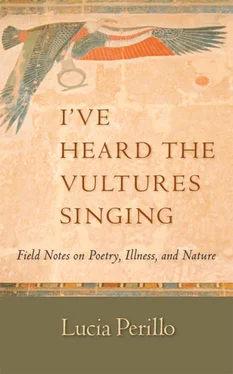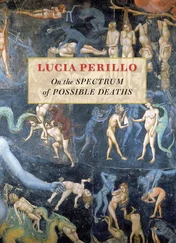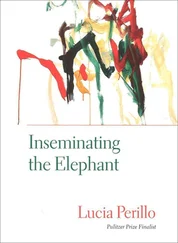But forget about the eagle; I have seen plenty in my life. Instead, we’re looking at thousands of Canada geese who have settled on the meadow, fat brown lumps obscured by the fat brown clumps of grass. Today their honks sound high-pitched and helpless , rather than imperious, which I think of as their normal tone of speech. This vista from the viewing platform forces me to re-rig my definition of the wilderness, but that’s all right — in former years Canada geese did nothing for me but annoy, what with their prolific bowel-expulsions and fondness for hissing at my knees. Now they’re what I’ve been presented with, and not just a half-dozen expelling away down at the city park. Here, they’re a thousand, or who knows how many thousands? Hard to tell, with the sun slanting low across the meadow’s humps.
The windbreaker-women surprise me, and touch me, with their sensitivity for nature: they encourage the children to look out at the geese through the heavy spotting scopes that are mounted on the platform. I confess to having held the snobbish notion that they’d be more interested in shotguns and hounds, but instead the women are urging the children to study the geese, the sounds they make, the way they move. Everyone is vying for position at the scopes; the children and I use the one that’s mounted low, while swallows loop from their mud-igloos under the old barn’s eaves and carve figure-eights in the air.
These geese, I think, are the utmost Montaigne-ians and Thoreau-ites, finding solitude in the midst of their collective. Each is possessed with a dignified hostility directed mainly at plucking the grass. Their necks lunge as they forage, the whole flock engaged in the same motion while each bird remains utterly alone in its small rage. The force of the group housed in the fierce one, a forceful solitude housed in the fierce many.
You see their duality most clearly, though, in the choreography of their flight. Orchestrated by what collective mind or momentarily unified solitudes? Housed where, as they clap their wings in front of them, then rise and elect one of themselves to take the lead? Housed in a glance? Housed in the air, in a shift of wind?
Graciously, the windbreaker family leaves me in the dusk (are you sure you’re okay? ), so I can sit here and watch the geese fly off across the delta. Is this momentous enough, is this sufficient ? From a distance, their groupings look like black ragged ropes constantly in the process of unraveling, setting loose a lone goose hoarsely honking. Then goose turns into geese again, as the rope rebraids.
Here in the country’s top left corner, where there are only two seasons — rain and not-rain — the year’s cyclical passage is punctuated by fish. Sure, there is summer, when the lawn’s green blades turn into dry bristles, and there is also winter with its white peaks, the mountains revealed on those rare days when the sky breaks through the clouds. But mountains and blue skies are only the year’s commas and hyphens, not the exclamation mark at the end of its paragraph. For that kind of rousing finale you need something on the order of a streambed full of dead fish.
For me, here’s how it goes: come November I drive a few miles outside my small city, where a logging road zigzags through a clear-cut where elk sometimes wander. There’s a brutal quality to the light that fills the clear-cut — it reveals the force of the human stamp on a place whose natural tendency would be to fill its empty spaces. But the road ends where the forest again closes in, around a clearing where squats a portable toilet’s trademark plastic box. From here the trail heads into the mostly Douglas firs that border Kennedy Creek.
It’s a location that falls pretty much in the middle of the spectrum of possible wildernesses. At one end of the spectrum might be a place like Seattle’s Ballard Locks, where salmon move up a mazelike series of concrete steps, and visitors watch from a concrete bunker underground whose one wall is made of plate glass. When a fish swims by, viewers see it as if on a wide-screen TV. Proximity substitutes for the complete sensual picture. You can look into a salmon’s nostril but you won’t hear the thrash of the uphill fight. And you don’t get the display of their extravagant deaths, which will take place later on the breeding grounds upstream.
Kennedy Creek is only a portable-toilet, five-miles-from-town kind of wilderness, but it doesn’t hold back when it comes to the sensuality of death. As soon as I get out of the car, the first scent to hit me is that of fish oil mixed with the peculiar sweetness of rotting meat. The trail has been upgraded recently to a swath of black crushed rock, and there are signboards to fill in the salmon’s backstory as well as to tell me how to comport myself. Do not wander from the trail. Keep your voice down. Apparently the water hears us just as we hear it.
What it sounds like is a washer swishing back and forth, the power cutting off then starting up again at a particularly explosive point in the laundry cycle. Less than a hundred yards from the parking lot there’s a footbridge over a sub-thread of the creek, where many of the fishes’ journeys terminate. Here, live chum salmon loiter in the company of the dead, which outnumber them two to one. This year the water level is high, and so the fish have traveled farther into the forest than I have ever seen them. The creek’s tributaries plunge down the vegetated slope, and these notches are so steep and so scantly filled that it scarcely seems possible the fish could have ascended them. Such disbelief is the spectacle’s human quotient.
Looking down from the bridge, I can see the living salmon mustering their resources in the creek’s foot-deep pockets. Then they hurl themselves up on the gravel bars over which flows maybe only an inch of water. They propel themselves with their fins, their bodies wholly in the air, and not the slow wriggle one might expect but instead a spurt construed from brute force and will. Their shoulders — but of course they do not have shoulders — heave the rest of their bodies forward until they reach another pocket deep enough to swim in.
There’s no hesitation once they decide to make a run for it. I see none who change their minds and give up, and head back, though often it seems their jaunts will leave them stranded. I watch a male battle his way upstream though I can see he’ll be trapped by a stick that has fallen with one end in the water and one end on the bank. He noses at this solid wall that blocks his upstream passage. He swims in place with the undulating movements of a snake. After five minutes of dinking around in the crotch of the stick, he finally heaves himself over it, even though it rests halfway out of the water. Lucky for him, the effort frees him back into the main channel of the stream.
It’s a lot to observe, these dramas in the creek, the many courtships transpiring amid the many dead. Fish hunker in the creek, a female and her would-be suitors quivering side by side. The dominant male will lunge over her back, weaving around her in a gymnastic pommel horse sort of foreplay, fending off any other male who attempts to intrude. She will have used a humping motion of her body to create a slight depression in the stones. Waiting beside her may also be other young males who’ve adopted the coloration of female fish, in the hope of sneaking under the radar of their bigger and more combative rivals. If everything goes according to plan, she’ll drop her eggs and then a male will fertilize them with the cloudy substance of his milt.
Then death will set in, however contrary to Darwin it seems: this strange twining of procreation and mortality. Other species, like steelhead, do not always die after they breed, and so it seems there is an altruism inherent in the salmon’s many deaths. They are animate tankers, ferrying particles from the ocean to this semi-urban forest. Traces of their carcasses have shown up in 137 other vertebrate species. The world is made of dead stuff, anyone who’s walked in the fallen leaves knows that. But animals we feel compelled to bury, if they enter the visual field of us humans who admit into our presence so few reminders of our own susceptibility to the state of being dead.
Читать дальше











![Various - Birds and Nature, Vol. 12 No. 5 [December 1902]](/books/745517/various-birds-and-nature-vol-12-no-5-december-thumb.webp)
![Various - Birds and Nature Vol. 11 No. 2 [February 1902]](/books/745533/various-birds-and-nature-vol-11-no-2-february-1-thumb.webp)